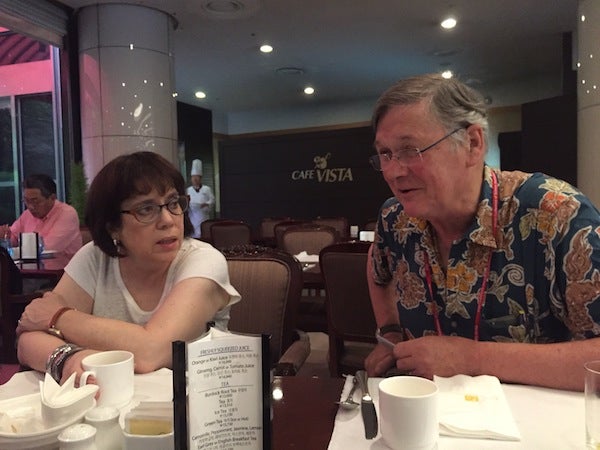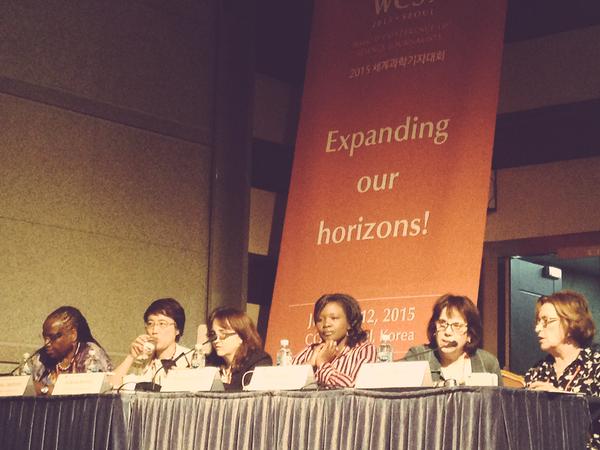This article was published in Scientific American’s former blog network and reflects the views of the author, not necessarily those of Scientific American
As a participant at the World Conference of Science Journalists last week in Seoul, I had a ringside seat for the running story of Nobel Prize-winner Sir Tim Hunt’s dismissive and offensive offhand remarks about female scientists. Reducing them to romantic distractions in the workplace that wilt in the face of criticism, he stunned an international audience by even calling for “single-sex labs.”
A social media uproar soon followed, and the 72-year-old British scientist was asked to resign from positions at University College London and the Royal Society. Hunt also stepped down from an advisory appointment at the European Research Council. In an exclusive interview at his British country home with the U.K.’s Observer, published online on Saturday, Hunt claimed that he’d only meant to make “a self-deprecating joke,” and he complained that he’d been “hung to dry by academic institutes who have not even bothered to ask me for my side of affairs.” His wife Mary Collins, herself a prominent scientist, backed him up, but there are numerous reasons to reject this as a misunderstood-martyr’s tale.
In fact, from the very start, Hunt had several opportunities to clarify his comments and make a more sincere apology for his injurious public remarks about the “trouble with girls” in science. At a hotel breakfast the day after his remarks, American journalist Deborah Blum followed up by asking him if his call for segregated labs had been a joke. As she reported in a series of tweets yesterday, he largely stood by what he’d said. Later, on BBC Radio 4's Today program, Hunt said he was “sorry” for offending his audience, but added: “I did mean the part about having trouble with girls.”
On supporting science journalism
If you're enjoying this article, consider supporting our award-winning journalism by subscribing. By purchasing a subscription you are helping to ensure the future of impactful stories about the discoveries and ideas shaping our world today.

Deborah Blum questions Tim Hunt at a hotel breakfast the morning after his remarks at the World Conference of Science Journalists. (Photo by Kathryn O'Hara)
Hunt should have known how painful reducing women to sexual objects would be. On Sunday, Michael Eisen, a biologist at UC Berkeley, recounted in a blog post how earlier this year, Hunt and he had been invited as “external advisors” to a meeting of young Indian researchers held in Kashmir. In one session, several women talked about how their careers had been held back by their superiors’ inability to control their lust. Apparently, the message was lost on Hunt. Referring to the social media fallout after the events in South Korea, Eisen wrote:
When I am thinking about what happened here, I am not thinking about how Twitter hordes brought down a good man because he had a bad day. I am instead thinking about what it says to the women in that room in Kashmir that this leading man of science – who it was clear everybody at the meeting revered – had listened to their stories and absorbed nothing. It is unconscionable that, barely a month after listening to a women moved to tears as she recounted a sexual assault from a senior colleague and how hard it was for her to regain her career, Hunt would choose to mock women in science as teary love interests.
Testimonials like those presented in Kashmir or closer to home abound, and despite considerable progress, problems persist in science and journalism alike.
The day after Hunt made his shocking comments in Seoul, I moderated a panel titled Sexism, Science Writing and Solutions: A Global Perspective. The widely attended session featured perspectives from prominent female science journalists in Argentina, Kenya, Japan, the U.S. and the U.K., including Blum and Connie St Louis, the British journalist who first called out Hunt on Twitter.

Members of the sexism in science writing panel at the World Conference of Science Journalists. From left to right: Connie St Louis, Mariko Takahashi, Valeria Román, Rosalia Omungo, Deborah Blum and Cristine Russell. (Photo by Renata Sanchez via Twitter)
The group’s excellent and perceptive presentations revealed widely shared concerns about overt and subtle gender bias, pay inequities and sexual harassment. But there were considerable national and regional differences as well, linked to geography, the local economy, living standards, political environment and the state of journalism in developing and developed parts of the world.
Rosalia Omungo, a young television journalist and news editor at the Kenya Broadcasting Corporation, based in Nairobi, said that she and most science journalists in Africa and her country are focused on pressing problems like climate change, environment and agriculture, so there is little time to focus on gender problems within the emerging science journalism profession.
Mariko Takahashi, a senior science writer at the Asahi Shimbun newspaper in Tokyo, where she’s worked since 1979, said the issue of sexism is scarcely addressed in Japan. She presented global data from an array of international organizations showing that Japan is “a big gender gap country.” It ranks near the bottom in an overall global World Economic Forum gender index (104 out of 142 countries in 2014) that measures the magnitude of gender disparities in health, education, economy and politics and tracks them over time. Another study she cited found that women hold less than 15 percent of the researcher positions in Japan. Likewise, Takahashi added, women account for only 15 percent of the workforce in the Japanese news media, compared to over 40 percent in France and the U.S. She later emailed to say that her paper had carried the Tim Hunt story. “Though it is short news, I am happy to see it is ranked as top in the access ranking,” she wrote.
Valeria Román, an Argentinian science journalist at Clarín newspaper in Buenos Aires, has long been a leader in science journalism in her country and on the international front as a former vice-president of the World Federation of Science Journalists. “There are still major barriers to work as a science journalist,” including low salaries, a lack of science journalism training, and criteria for getting ahead that are not based on skills and training,” she said. She added that although it ranks lower within the media, science and health news is popular in Argentina. (News of Román’s appearance on the panel reached a Spanish website in her hometown of Chacabuco, complete with a photo she had tweeted earlier.)
Blum, the new director of the Knight Science Journalism program at MIT, cited statistics showing that women in American science writing, despite going into the field in greater numbers than men, are still often “invisible” during their careers, with fewer bylines, awards and recognition than their male peers. The data, gathered by her former University of Wisconsin-Madison graduate students, was first presented at the Solutions Summit for Women in Science Writing held at MIT in June 2014. The event was sponsored by the U.S. National Association of Science Writers and designed to examine systemic problems within the profession.
St Louis, a former president of the Association of British Science Writers, cited poignant examples of sexual harassment from a new and long-awaited report commissioned by the association, “Sexism in Science Journalism,” which was released in conjunction with our panel.
Hopefully the media storm that swept over Sir Tim Hunt and his controversial comments will die down, leaving in its wake greater global awareness of gender disparities and more public and private pockets supporting a corps of highly energized practitioners. With such persistent problems still facing professional women in science and science writing, it’s past time for the world to redouble efforts to support potential solutions that could help encourage, boost and promote girls and women at all levels.